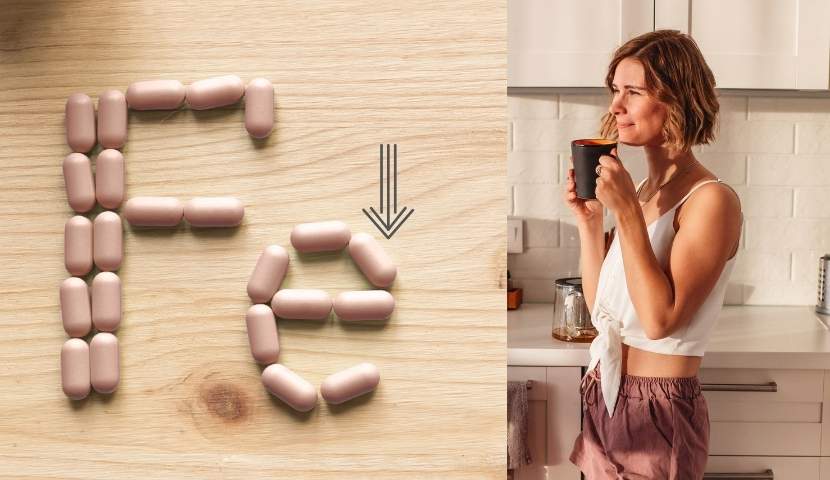Coffee is more than just a morning ritual; it’s a global phenomenon cherished by millions. However, for those mindful of their iron intake—such as vegetarians, vegans, pregnant individuals, or those with anemia—it’s crucial to understand how coffee interacts with iron absorption.
Research indicates that compounds in coffee can significantly inhibit the body’s ability to absorb iron, particularly non-heme iron found in plant-based foods.

Understanding Iron Absorption
Before delving into coffee’s effects, it’s essential to grasp how iron is absorbed:
- Heme Iron: Found in animal products like meat and seafood, heme iron is more readily absorbed by the body.
- Non-Heme Iron: Predominantly present in plant-based foods such as lentils, spinach, and beans, non-heme iron is less efficiently absorbed.
The absorption of non-heme iron is influenced by various dietary factors, including the presence of enhancers like vitamin C and inhibitors like polyphenols.
The Role of Coffee in Iron Absorption
Polyphenols and Tannins: The Primary Culprits
Coffee contains polyphenols, particularly chlorogenic acid, and tannins—compounds known to bind with iron during digestion. This binding forms insoluble complexes, making it challenging for the body to absorb iron effectively. Studies have shown that beverages with higher polyphenol content can reduce iron absorption by 50–90%.
Caffeine’s Impact
While caffeine itself has a modest effect on iron absorption, its presence in coffee can exacerbate the inhibitory effects of polyphenols. Caffeine may also have a mild diuretic effect, potentially increasing the excretion of iron and other minerals.

How Coffee Affects Different Types of Iron
- Heme Iron: Generally, coffee has a minimal impact on the absorption of heme iron. This form of iron is more efficiently absorbed by the body and is less susceptible to dietary inhibitors.
- Non-Heme Iron: Coffee significantly affects the absorption of non-heme iron. For instance, consuming coffee with a meal can reduce iron absorption from a hamburger by 39%, whereas tea can reduce it by 64%.
Who Is Most at Risk?
Certain groups may be more susceptible to the effects of coffee on iron absorption:
- Vegetarians and Vegans: Relying on plant-based sources for iron, these individuals may face challenges due to the lower bioavailability of non-heme iron.
- Pregnant Women: Increased iron requirements during pregnancy make it essential to monitor factors that could impede iron absorption.
- Individuals with Anemia: Those already with low iron levels should be cautious, as coffee can further hinder iron absorption.
Strategies to Mitigate Coffee’s Impact on Iron Absorption
While enjoying your coffee is important, consider these tips to minimize its effects on iron absorption:
- Timing Matters: Avoid consuming coffee during or immediately after meals. Waiting at least one hour before or after meals can reduce its inhibitory effects on iron absorption.
- Enhance Iron Absorption: Pair iron-rich meals with vitamin C-rich foods like citrus fruits, bell peppers, and tomatoes to boost non-heme iron absorption.
- Separate Intake: If taking iron supplements, avoid consuming them with coffee. It’s advisable to wait at least one to two hours between taking iron supplements and drinking coffee.
Conclusion
While coffee offers numerous health benefits, including antioxidant properties and improved cognitive function, it’s essential to be aware of its potential impact on iron absorption. By understanding the science behind this interaction and adopting mindful consumption habits, individuals can enjoy their coffee without compromising their iron levels.
Frequently Asked Questions
Can I drink coffee if I’m iron deficient?
It’s advisable to limit coffee consumption around meal times, especially if you rely on plant-based sources of iron. Consult with a healthcare professional for personalized advice.
Does decaffeinated coffee affect iron absorption?
Yes, decaffeinated coffee still contains polyphenols and tannins that can inhibit iron absorption.
How can I enhance iron absorption from plant-based foods?
Incorporate vitamin C-rich foods into your meals, such as citrus fruits, to enhance the absorption of non-heme iron.
Is there a safe amount of coffee to drink without affecting iron absorption?
Moderate coffee consumption, such as one cup per day, is generally safe. However, it’s essential to consider timing and individual health factors.
Are there any alternatives to coffee that don’t affect iron absorption?
Herbal teas, such as peppermint or chamomile, typically have minimal impact on iron absorption. However, always check for individual sensitivities.



0 Comments